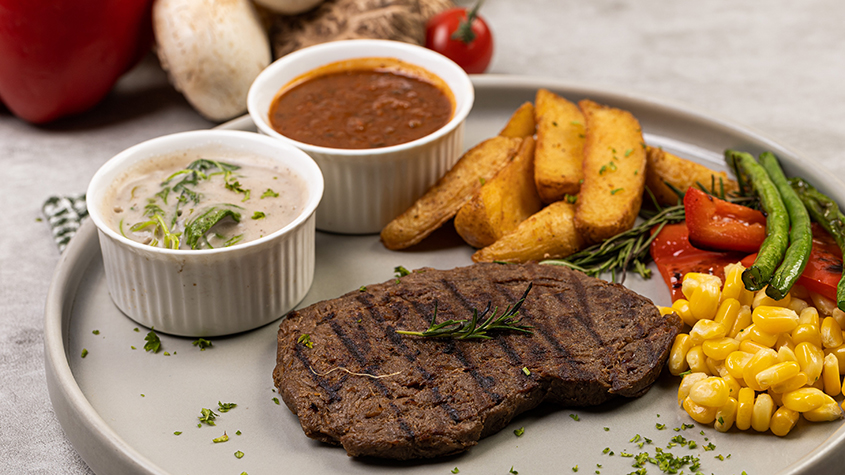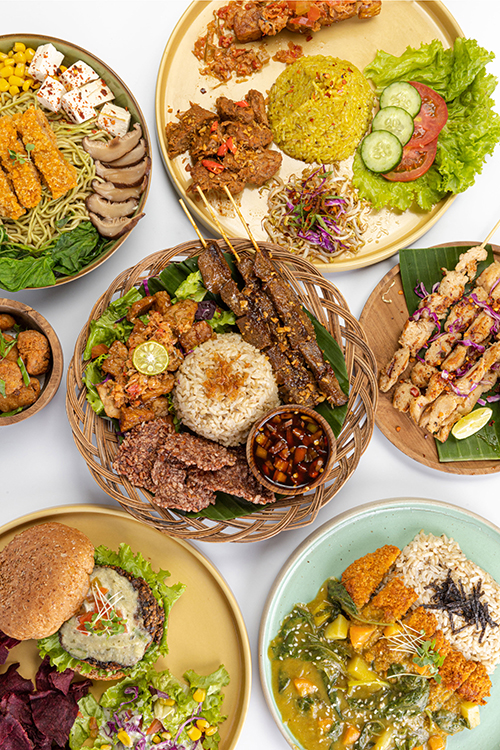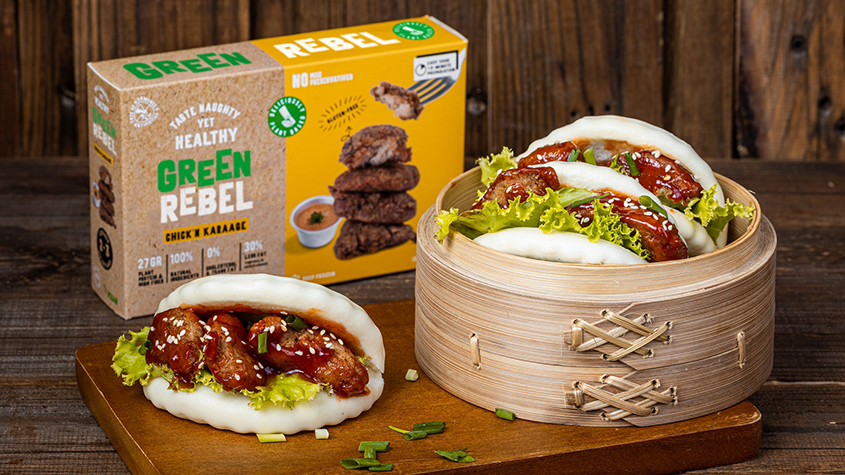Burgreens & Green Rebel Plant-Based Meat to Keep People Healthy and Save the Planet
Max Mandias and Helga Angelina, both from Indonesia, met in Haarlem, in the Netherlands, while studying. Max graduated as a finance and data analyst, and Helga as a marketer. However, they both took another path and followed their passion for healthy food, respectful of the environment. From the opening in 2013 of a humble vegan café in Rampoa to the leading plant-based food chain in Indonesia with 16 outlets, the young couple creatively overcame challenges and is now looking at expanding in and beyond Indonesia, with a strong branding strategy.

Helga was a long-time vegetarian when they met but the young people were not environmental activists. “Everyone has his own turning point”, Max said. While in the Netherlands, the couple was exposed to early environmental movements in Europe and grew environmentally conscious. “Our movie nights were about watching documentaries on environmental issues, climate change,” Helga recalled.
Being a finance and data analyst “did not really click” for Max so he switched to nutrition. While still in the Netherlands, he volunteered in a raw food restaurant in Amsterdam, the “Alchemist Garden”. “I realized that food can be made super fun,” he remembers. “We had never seen food in that light before.”
Max became a vegetarian and rather than feeling helpless, in December 2012, the young couple decided that they wanted to be part of the solution rather than part of the problem. “We decided to do that through food,” explained Max. By then they had watched a documentary called Cowspiracy: The Sustainability Secret, and became aware of the adverse environmental effect of dairy products and had gone vegan.
Humble Beginnings with Burgreens’ First Vegan Café
Back in Indonesia, Max and Helga were set on opening a vegan café with the ultimate dual goal of convincing people that vegetables can taste good, and helping local farmers. In 2013, they opened their first Burgreens outlet.
“We realized that most people want to eat healthily and contribute to the environment. What matters is the taste,” she said. They started with something everyone eats and can relate to: burgers.

They pooled their modest savings and opened a humble sit-down vegan café, away from the city center and strategic locations. They handled everything from shopping in the local market to producing the burger patty, to serving veggie burgers in the café, working seven days a week, up to 20-hour shifts.
“We were born digital and we used websites such as TRIP Advisor and Happy Cow” to advertise their business, Max said. They also used social media, and word of mouth.
Burgreens Vegan Food with Asian and Western Fusion
In the first months, Burgreens served mostly Western-inspired food, but gradually, they introduced Asian food. According to Helga, the key to making plant-based food a lifestyle is to integrate something that people eat daily. Burgreens started offering vegan versions of typical Indonesian dishes, such as Rendang bowls, meat-like bowl soups, Bibimbap, and Vegan Boba.
Over the years, Burgreens’ menu grew to develop an Asian/Western fusion concept with Asian, Korean, and Japanese influences. “We make every food that people love but plant-based,” Helga said.
On a Mission – Promoting Plant-Based Diet while Reducing Food Miles

Max and Helga did not go through market research and went heads-on with their project. “We were one of the first players in the field, and it was definitively way too early,” said Helga. “We started with a mission, and tried to educate the market, introduce the plant-based meal concept.”
After three years of efforts, the business started to pick up speed, surfing on the global growing trend of healthy diets and lifestyles. The company grew with the demand, opening more outlets. Burgreens now operates 16 outlets, set up as casual vegan restaurants with 30 to 50 seaters in Greater Jakarta, Bandung, and Bali, increasingly in strategic locations, malls, and busy shopping streets. They employ over 250 people.
They did not forget their goal of helping farmers and consider Burgreens as a social enterprise. They source over 50% of their ingredients from local farmers and work with 35 farmers’ communities across Indonesia, representing 600 farmers.
Green Rebel Frozen Vegan Meals
It had always been the plan to create a separate business unit to conduct research and development to create the plant-based “meat”, “cheese”, and sauce for the use of Burgreens, Helga said. When the Covid-19 pandemic hit, sales plummeted, threatening its 250 employees and the survival of the company, Max and Helga did what they do best: they sprung into action. “We had those 250 people on our payroll and we had to find ways to keep them productive so we could retain the jobs,” she said. “We turned our bestsellers into frozen food and launched them on the market, with very minimal packaging.”

Within 6 months, they created a new brand, raised money, and started building a facility to produce frozen vegan meals on a larger scale. “That is how Green Rebel was born,” she said, adding, “it saved us.”
Paving the Way for vegan food in Indonesia that is FDA-approved
Challenges for Burgreens and Green Rebel are quite different, according to Max. Burgreens still have to convince non-vegans to try plant-based food. The company also has to keep a consistent quality across all outlets spread over different islands. Expanding in Indonesia, Max said, means there is a cultural element that cannot be avoided, there is no real copying and pasting of an outlet.
The main challenge for Green Rebel has been the regulatory approval for plant-based meat products, May said. “We submitted our products to the Indonesian FDA (Food and Drug Administration) and it took one year to get approval.” “We paved the way,” he said, “being a pioneer; you have to have that struggle.”
Expanding Burgreens and Green Rebel Internationally
With Burgreens cafes back on track and Green Rebel bustling, Max and Helga are planning to expand domestically, growing to 20 outlets in Indonesia, and making sure the largest cities have a Burgreens outlet.
At present, Burgreens operates all outlets, but the company is seeking to open franchised restaurants in Australia, the Philippines, and Singapore for starters.
Green Rebel is already expanding regionally in 2022: Singapore in March, the Philippines and Malaysia before the summer, South Korea and Australia at the end of the year. Green Rebel products, such as beef and chicken meat alternatives, wholefood protein mushroom patties, and cheese, will be sold through exclusive distributors in supermarkets and specialized stores.
Strong Vegan Branding serves Global Ambition
Intellectual property has been “super important” for Burgreens and even more so for GreenRebel which has a global ambition, Helga said. Both brands are registered internationally, in 12 countries, with some still pending. For the product formulation, she explained, “we do it the Coca-Cola way,” relying on trade secrets.
Benefits of a Vegan Diet
Helga went vegetarian when she was 15 to fight off some health issues, which she said greatly improved over the following two years. According to the young woman, a balanced, healthy vegan diet can have “enormous health benefits,” with decreased health risks, such as diabetes, cardiovascular diseases, and cancer, can improve the functioning of the immune system, help maintain an ideal weight, improve sports performances, and is a great ally for glowing skin.
Eating vegan is also good to mitigate climate change by reducing greenhouse gas emissions, she said. “We did a life cycle assessment comparing the environmental impact of our plant-beef rendang (popular beef curry) versus a local beef rendang and they found that ours had a 90% less global warming potential in terms of water and land use, and energy needs”, Helga detailed. “Imagine if we can get a lot of people to swap their meat-based meal for a plant-based meal a couple of times a week?”
Source: WIPO

 Client Focus
Client Focus